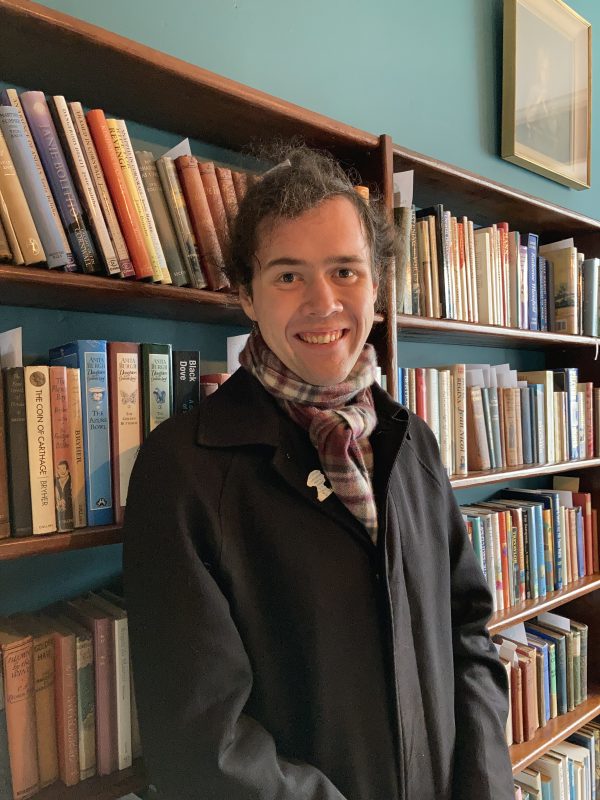In 2021, Exeter University student J.T. Albright made his first visit to Morrab Library, one which would change the course of his academic career and, through our archives, immerse him into the world of Regency Penzance. Having now graduated and moved further afield to York to continue his studies, J.T. has not only shared this beautiful blog about his time with us at the Library (see below), but also given us access to his brilliant dissertation, which clearly demonstrates the value of our archive collections. You can click here to read his paper, wonderfully titled : ‘It is a Truth Universally Acknowledged That There are no Secrets: Gossip’s Role in the Regency Era Ballroom’

Where does one begin when extolling the virtues of the Morrab Library? Many of them are self-evident: the elegant house full of old books, the sea views and picturesque surroundings of Morrab Gardens, friendly faces and cups of tea, the list could go on infinitely, yet I would say its delights go far deeper than those, lovely as they are. My relationship with the Morrab Library started on a rainy autumn day in 2021 when, at the behest of a dear professor of mine from the University of Exeter, Penryn Campus, I decided to make the long journey by bus from my home in Penryn in order to see the magical environment for myself. If the vast collection of books and quaint ambience did not seal the deal immediately, impossible as that sounds, the rich and varied archive did. Little did I know that when I first entered through that wonderful red portal, the trajectory of my life would change entirely.
It would be correct to say that I have always had an interest in the eighteenth-century, alongside my undying love of rural England, but I had previously thought that my interest in English society would tend more towards the Victorians rather than the Georgians. Now, that position has completely reversed. For my undergraduate, which was an interdisciplinary degree combining English Literature and History, I decided to tackle my three biggest interests when writing my dissertation: Jane Austen and her world, sociability and gossip, and how novels can be used to study history. The Morrab Library, with its archive and special collections, was the primary way that I was able to turn fiction into reality, though perhaps one could say that fiction may come from reality. Through investigating their catalogue, I was able to travel back to Penzance of the 1790s and become a part of this wonderful town’s life in a unique and intimate way.
With Lisa’s help and guidance, I had the privilege of meeting Catharine Tremenheere, nee Borlase, and through her letters I attended balls at the Penzance Assembly Rooms in 1792 and 1793. I would describe her as a slightly more sensible version of the immortal Mrs Bennet in Pride and Prejudice, their minds seem to have been in a similar place though Mrs Tremenheere showed a bit more gentility than dear Mrs Bennet. Alongside Catharine Tremenheere’s letters, which are numerous and a treat to read, I used the 1791 Penzance Assembly Book, which recorded all the accounts and details of the social seasons from 1791-1794, to find out who her neighbours were and how often they saw each other. In addition to her records of balls and assemblies, Catharine Tremenheere also writes about dinner parties, visits to the theatre, and even about riots in Penzance around the time of the French Revolution.
Through her eyes, I saw just how vibrant the Georgians were and that the events in Jane Austen’s novels were not as unrealistic as one may have thought. That is the joy of researching the past and reading books, is it not? The drama and sensibility we find in novels, and think so silly as a result, may not be too far-fetched as we originally believed. Catharine Tremenheere records all sorts of novel-like happenings in Penzance society and in such an endearing way that by the time I reached the letter where her son Walter tells his brother Harry Pendarves that their mother is dead, I was near to tears. This intense journey, both intellectually and emotionally, would never have happened without the Morrab Library and its archive.
From all this foraying into Penzance’s past, in this fantastic setting which we all are a part of, my life has now taken a turn towards making the eighteenth-century its gravitational centre. Soon I shall begin a masters course in eighteenth-century studies to continue my research into the function of assembly rooms in rural society and, hopefully, turning that into a PhD once I complete the next step. All this stemmed from two deeply important sources: my love of Pride and Prejudice and the ability to see how the world Jane Austen wrote about still exists in delightfully large quantities all around us through the archive at the Morrab Library. Certainly, it has been a journey of love and passion through discovery and investigation.
